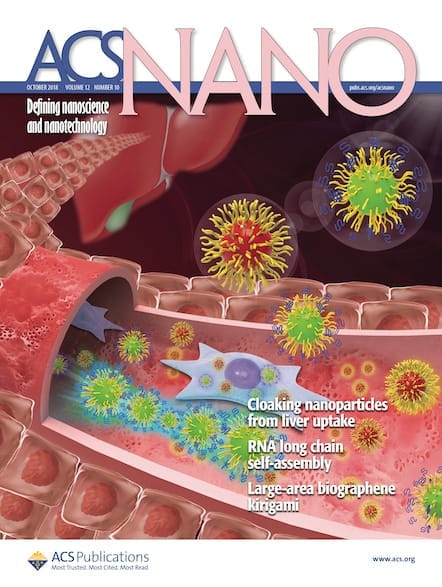Professor C. Jeffrey Brinker is a Distinguished and Regent’s professor emeritus in the Departments of Chemical & Biological Engineering and Molecular Genetics & Microbiology, and a member of the Comprehensive Cancer Center at the University of New Mexico (UNM). He is also the Co-Director of the Center for Micro-Engineered Materials and one of several fellow […]

Professor C. Jeffrey Brinker is a Distinguished and Regent’s professor emeritus in the Departments of Chemical & Biological Engineering and Molecular Genetics & Microbiology, and a member of the Comprehensive Cancer Center at the University of New Mexico (UNM). He is also the Co-Director of the Center for Micro-Engineered Materials and one of several fellow s at Sandia National Laboratories. He has published more than 40 papers in ACS Publications journals. In March 2019, he joined ACS Nano as an associate editor.
During his 40-year career, Brinker pioneered the field of sol-gel processing of porous and composite ceramic materials and combined sol-gel processing with molecular self-assembly to create highly ordered mesoporous films and particles for applications in energy and nanomedicine.
I interviewed Professor Brinker about his work and some advice he has for those who want to pursue a career in science.
What are you currently working on? and what are some challenges you’re hoping to solve?
A personalized cancer vaccine that can abolish established tumors.
What are the major challenges facing your field today?
Protection and delivery of personalized cancer neoantigens to antigen-presenting cells.
How do you think your current research will contribute to the science community and eventually the general public?
Well, a personalized cancer vaccine speaks for itself.
What do you think is the most interesting and/or important unsolved problem in your field?
Simple FDA-approvable strategies to create personalized vaccines.
Have you received any good advice that stuck with you? How has it helped you within your career?
My first boss suggested I explore a then-new (1979) field of sol-gel processing, wherein inorganic materials were constructed molecule-by-molecule, essentially starting the nano revolution before it was referred to as nano.
What advice would you give people who want to pursue a career in science? If you had to start over again, what advice would you give yourself?
Remain curious – no experiment is a failure – it is just your failure to understand the underlying physical and chemical principles and maybe this so-called failure would lead to productive new directions.
Read a Selection of Professor Brinker’s Research:
Metal–Organic Framework Nanoparticle-Assisted Cryopreservation of Red Blood Cells
J. Am. Chem. Soc. 2019, 141, 19, 7789-7796
Conversion of Metal–Organic Cage to Ligand-Free Ultrasmall Noble Metal Nanocluster Catalysts Confined within Mesoporous Silica Nanoparticle Supports
Nano Lett. 2019, 19, 3, 1512-1519
Molecular Dynamics Simulations of the Silica–Cell Membrane Interaction: Insights on Biomineralization and Nanotoxicity
J. Phys. Chem. C 2018, 122, 37, 21330-21343
Controlled Fabrication of Functional Capsules Based on the Synergistic Interaction between Polyphenols and MOFs under Weak Basic Condition
ACS Appl. Mater. Interfaces 2017, 9, 16, 14258-14264
Three-Dimensional Encapsulation of Saccharomyces cerevisiae in Silicate Matrices Creates Distinct Metabolic States as Revealed by Gene Chip Analysis
ACS Nano 2017, 11, 4, 3560-3575
